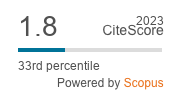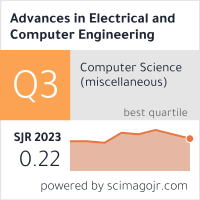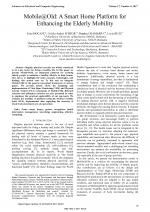| 4/2017 - 3 |
Mobile@Old: A Smart Home Platform for Enhancing the Elderly MobilityMOCANU, I. |
| View the paper record and citations in |
| Click to see author's profile in |
| Download PDF |
Author keywords
smart homes, gesture recognition, health information management, knowledge engineering, affective computing
References keywords
elderly(13), health(9), physical(8), link(8), games(8), activity(7), game(6), exercise(6), system(5), older(5)
Blue keywords are present in both the references section and the paper title.
About this article
Date of Publication: 2017-11-30
Volume 17, Issue 4, Year 2017, On page(s): 19 - 26
ISSN: 1582-7445, e-ISSN: 1844-7600
Digital Object Identifier: 10.4316/AECE.2017.04003
Web of Science Accession Number: 000417674300003
SCOPUS ID: 85035752682
Abstract
Regular physical exercises are widely considered to be a key factor for living a healthy life. In this paper we present Mobile@Old, an integrated platform for assisting elderly people to maintain a healthy lifestyle in their homes. Our aim is to highlight the main concepts, technologies, and findings this system rests on. To this end we integrate Mobile@Old in the general conceptual framework of serious games. We provide details about the designing and implementation of Vital Signs Monitoring (VSM) and Physical Activity Trainer (PAT) components of Mobile@Old. Relevant exercises and utilization scenarios are also presented in order to emphases the practical applicability of our approach. We evaluate the usability of platform using the System Usability Scale (SUS). Experimental data regarding the accuracy of whole body movements are also presented |
| References | | | Cited By «-- Click to see who has cited this paper |
| [1] A. H. Maslow, R. Frager, J. Fadiman, C. McReynolds, and R. Cox, Motivation and personality, vol. 2. Harper & Row New York, 1970.
[2] K. J. Reid, K. G. Baron, B. Lu, E. Naylor, L. Wolfe, and P. C. Zee, "Aerobic exercise improves self-reported sleep and quality of life in older adults with insomnia," Sleep medicine, vol. 11, no. 9, pp. 934-940, 2010, [CrossRef] [Web of Science Times Cited 360] [SCOPUS Times Cited 432] [3] C. Martins, M. D. Robertson, and L. M. Morgan, "Effects of exercise and restrained eating behaviour on appetite control," Proceedings of the Nutrition Society, vol. 67, no. 01, pp. 28-41, 2008, [CrossRef] [Web of Science Times Cited 51] [SCOPUS Times Cited 54] [4] S. Iinattiniemi, J. Jokelainen, and H. Luukinen, "Exercise and risk of injurious fall in home-dwelling elderly," International journal of circumpolar health, vol. 67, no. 2-3, pp. 235-244, 2008. [5] Y.-L. Theng, P. F. Teo, and P. H. Truc, "Investigating sociability and affective responses of elderly users through digitally-mediated exercises: a case of the Nintendo Wii," in Human-Computer Interaction, Springer, 2010, pp. 152-162, [CrossRef] [SCOPUS Times Cited 21] [6] J. B. Moore, N. G. Mitchell, M. W. Beets, and J. B. Bartholomew, "Physical self-esteem in older adults: A test of the indirect effect of physical activity.," Sport, Exercise, and Performance Psychology, vol. 1, no. 4, p. 231, 2012, [CrossRef] [Web of Science Times Cited 33] [SCOPUS Times Cited 36] [7] B. M. Brown et al., "Intense physical activity is associated with cognitive performance in the elderly," Translational psychiatry, vol. 2, no. 11, p. e191, 2012, [CrossRef] [Web of Science Times Cited 90] [SCOPUS Times Cited 98] [8] A. Sirkka, S. Merilampi, A. Koivisto, M. Leinonen, and M. Leino, "User experiences of mobile controlled games for activation, rehabilitation and recreation of elderly and physically impaired.," Studies in health technology and informatics, vol. 177, pp. 289-295, 2011. [9] "Global recommendations on Physical Activity for health. World Health Organization." [Online] Available: Temporary on-line reference link removed - see the PDF document [10] C. J. Caspersen, M. A. Pereira, K. M. Curran, and others, "Changes in physical activity patterns in the United States, by sex and cross-sectional age," Medicine and science in sports and exercise, vol. 32, no. 9, pp. 1601-1609, 2000. [11] M. Tabak, M. Dekker-van Weering, H. van Dijk, and M. Vollenbroek-Hutten, "Promoting daily physical activity by means of mobile gaming: a review of the state of the art," Games for health journal, vol. 4, no. 6, pp. 460-469, 2015, [CrossRef] [Web of Science Times Cited 38] [SCOPUS Times Cited 39] [12] J. Wiemeyer and A. Kliem, "Serious games in prevention and rehabilitation-a new panacea for elderly people?," European Review of Aging and Physical Activity, vol. 9, no. 1, p. 41, 2011, [CrossRef] [Web of Science Times Cited 120] [SCOPUS Times Cited 157] [13] M. Zyda, "From visual simulation to virtual reality to games," Computer, vol. 38, no. 9, pp. 25-32, 2005, [CrossRef] [Web of Science Times Cited 901] [SCOPUS Times Cited 1281] [14] S. H. Fraile, J. Browne, E. Brox, and G. Evertsen, "Suitability analysis of commercial open-source driven motion sensor devices applied to exergames for the elderly," in Ambient Assisted Living Forum Eindhoven, 2012. [15] M. K. P. Tran, F. Bremond, and P. Robert, "How to interest Seniors with Serious Games?", [Online] Available: Temporary on-line reference link removed - see the PDF document [16] S. McCallum and C. Boletsis, "Dementia games: A literature review of dementia-related serious games," in International Conference on Serious Games Development and Applications, 2013, pp. 15-27, [CrossRef] [SCOPUS Times Cited 93] [17] F. Cassola, L. Morgado, F. de Carvalho, H. Paredes, B. Fonseca, and P. Martins, "Online-Gym: a 3D virtual gymnasium using Kinect interaction," Procedia Technology, vol. 13, pp. 130-138, 2014 [CrossRef] [18] C.-J. Su, C.-Y. Chiang, and J.-Y. Huang, "Kinect-enabled home-based rehabilitation system using Dynamic Time Warping and fuzzy logic," Applied Soft Computing, vol. 22, pp. 652-666, 2014, [CrossRef] [Web of Science Times Cited 105] [SCOPUS Times Cited 123] [19] E. Brox et al., "GameUp: Exergames for Mobility-A Project to Keep Elderly Active," in XIV Mediterranean Conference on Medical and Biological Engineering and Computing 2016, 2016, pp. 1219-1224, [CrossRef] [Web of Science Times Cited 2] [SCOPUS Times Cited 4] [20] K. M. Gerling, K. K. Dergousoff, and R. L. Mandryk, "Is movement better?: comparing sedentary and motion-based game controls for older adults," in Proceedings of Graphics Interface 2013, 2013, pp. 133-140. [21] J. A. Garcia Marin, "The use of interactive game technology to improve the physical health of the elderly: a serious game approach to reduce the risk of falling in older people," 2015. [22] M. Rice, W. P. Tan, J. Ong, L. J. Yau, M. Wan, and J. Ng, "The dynamics of younger and older adult's paired behavior when playing an interactive silhouette game," in Proceedings of the SIGCHI Conference on Human Factors in Computing Systems, 2013, pp. 1081-1090, [CrossRef] [SCOPUS Times Cited 32] [23] A. Rocha et al., "Innovations in health care services: The CAALYX system," International journal of medical informatics, vol. 82, no. 11, pp. e307-e320, 2013, [CrossRef] [Web of Science Times Cited 63] [SCOPUS Times Cited 70] [24] "Health@Home." [Online] Available: Temporary on-line reference link removed - see the PDF document [25] "The Reaction Project - News." [Online] Available: Temporary on-line reference link removed - see the PDF document [26] "LinkWatch" [Online] Available: Temporary on-line reference link removed - see the PDF document [27] P. Kakria, N. K. Tripathi, and P. Kitipawang, "A real-time health monitoring system for remote cardiac patients using smartphone and wearable sensors," International journal of telemedicine and applications, vol. 2015, p. 8, 2015, [CrossRef] [Web of Science Times Cited 194] [SCOPUS Times Cited 320] [28] I. Mocanu, L. Rusu, and D.? A. Sitar Taut,?"Business Process Analysis for MOBILE@OLD, " in?9th International Conference on Intelligent Systems and Agents, pp. 65-72, 2015. [29] I. Mocanu, C. Marian, L. Rusu, and R. Arba, "A Kinect based adaptive exergame," in Intelligent Computer Communication and Processing (ICCP), 2016 IEEE 12th International Conference on, 2016, pp. 117-124, [CrossRef] [SCOPUS Times Cited 14] [30] I. Mocanu and O. A. Schipor, "A Serious Game for Improving Elderly Mobility Based on User Emotional State," in The International Scientific Conference eLearning and Software for Education, 2017, vol. 2, p. 487, [CrossRef] [31] A. Awada, I. Mocanu, S. Jecan, A. M. Florea, O. Cramariuc, B. Cramariuc, "Mobile@Old - An assistive platform for maintaining a healthy lifestyle for elderly people," presented at the EHB Conference 2017. [32] O. A. Schipor and I. Mocanu, "Making E-Mobility Suitable for Elderly," in The International Scientific Conference eLearning and Software for Education, 2016, vol. 1, p. 283, [CrossRef] [Web of Science Times Cited 2] [33] O. Geman and H. Costin, "Automatic assessing of tremor severity using nonlinear dynamics, artificial neural networks and neuro-fuzzy classifier," Advances in Electrical and Computer Engineering, vol. 14, no. 1, pp. 133-138, 2014, [CrossRef] [Full Text] [Web of Science Times Cited 28] [SCOPUS Times Cited 28] [34] R.-D. Vatavu and J. O. Wobbrock, "Formalizing agreement analysis for elicitation studies: new measures, significance test, and toolkit," in Proceedings of the 33rd Annual ACM Conference on Human Factors in Computing Systems, 2015, pp. 1325-1334, [CrossRef] [Web of Science Times Cited 145] [SCOPUS Times Cited 199] [35] R.-D. Vatavu, "Beyond Features for Recognition: Human-Readable Measures to Understand Users' Whole-Body Gesture Performance," International Journal of Human-Computer Interaction, pp. 1-18, 2017, [CrossRef] [Web of Science Times Cited 12] [SCOPUS Times Cited 20] [36] O.-A. Schipor, R.-D. Vatavu, "Software Architecture Design for Spatially-Indexed Media in Smart Environments," Advances in Electrical and Computer Engineering, vol.17, no.2, pp.17-22, 2017, [CrossRef] [Full Text] [Web of Science Times Cited 7] [SCOPUS Times Cited 11] [37] K. Arai, "Vital sign and location/attitude monitoring with sensor networks for the proposed rescue system for disabled and elderly persons who need a help in evacuation from disaster areas," sensors, vol. 3, no. 1, 2014, [CrossRef] [38] D. T. Zdrenghea, M. Ilea, M. D. Zdrenghea, A. V. Sitar-Taut, and D. Pop, "The Effect of Maximal and Submaximal Exercise Testing on NT-proBNP Levels in Patients with Systolic Heart Failure," Romanian Review of Laboratory Medicine, vol. 22, no. 1, pp. 25-33, 2014, [CrossRef] [Web of Science Times Cited 9] [SCOPUS Times Cited 7] [39] J. Hyry, "Designing Projected User Interfaces as Assistive Technology for the Elderly", Acta Universitatis Ouluensis, A Scientiae Rerum Naturalium 664, ISBN 978-952-62-1069-8,2015. [40] S. McLellan, A. Muddimer, and S. C. Peres, "The effect of experience on System Usability Scale ratings," Journal of Usability Studies, vol. 7, no. 2, pp. 56-67, 2012. [41] "Unity - Game Engine." [Online] Available: Temporary on-line reference link removed - see the PDF document. [42] "Kinect v2 Examples with MS-SDK by RF Solutions," Unity Asset Store. [Online] Available: Temporary on-line reference link removed - see the PDF document [43] "Kinect for Windows SDK 2.0," Microsoft Download Center. [Online] Available: Temporary on-line reference link removed - see the PDF document [44] B. J. Mortazavi, M. Pourhomayoun, S. I. Lee, S. Nyamathi, B. Wu, and M. Sarrafzadeh, "User-optimized activity recognition for exergaming," Pervasive and Mobile Computing, vol. 26, pp. 3-16, 2016, [CrossRef] [Web of Science Times Cited 6] [SCOPUS Times Cited 9] Web of Science® Citations for all references: 2,166 TCR SCOPUS® Citations for all references: 3,048 TCR Web of Science® Average Citations per reference: 48 ACR SCOPUS® Average Citations per reference: 68 ACR TCR = Total Citations for References / ACR = Average Citations per Reference We introduced in 2010 - for the first time in scientific publishing, the term "References Weight", as a quantitative indication of the quality ... Read more Citations for references updated on 2024-10-19 10:11 in 171 seconds. Note1: Web of Science® is a registered trademark of Clarivate Analytics. Note2: SCOPUS® is a registered trademark of Elsevier B.V. Disclaimer: All queries to the respective databases were made by using the DOI record of every reference (where available). Due to technical problems beyond our control, the information is not always accurate. Please use the CrossRef link to visit the respective publisher site. |
Faculty of Electrical Engineering and Computer Science
Stefan cel Mare University of Suceava, Romania
All rights reserved: Advances in Electrical and Computer Engineering is a registered trademark of the Stefan cel Mare University of Suceava. No part of this publication may be reproduced, stored in a retrieval system, photocopied, recorded or archived, without the written permission from the Editor. When authors submit their papers for publication, they agree that the copyright for their article be transferred to the Faculty of Electrical Engineering and Computer Science, Stefan cel Mare University of Suceava, Romania, if and only if the articles are accepted for publication. The copyright covers the exclusive rights to reproduce and distribute the article, including reprints and translations.
Permission for other use: The copyright owner's consent does not extend to copying for general distribution, for promotion, for creating new works, or for resale. Specific written permission must be obtained from the Editor for such copying. Direct linking to files hosted on this website is strictly prohibited.
Disclaimer: Whilst every effort is made by the publishers and editorial board to see that no inaccurate or misleading data, opinions or statements appear in this journal, they wish to make it clear that all information and opinions formulated in the articles, as well as linguistic accuracy, are the sole responsibility of the author.





